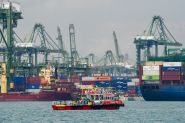
I have always believed that geography makes history. But in the Middle East, history tends to repeat itself with a sectarian accent and a militia soundtrack. And this is tragically evident in Lebanon, a country that once had everything, and today, has nothing but memory and myth.
While the world watches US envoy Tom Barrack shuttle between Jerusalem, Damascus and Beirut, brokering what could be a historic Syria–Israel normalization deal by year’s end, it’s worth asking: What happens to Lebanon once the region moves on without it?
Because the truth is, Lebanon isn’t just falling behind. It may be falling apart.
Our Lebanon has been a broken formula since birth. For over a century, Lebanon has functioned—or rather malfunctioned—under a fragile formula: power-sharing among 18 sects, each one with a veto and none with a vision. The Grand Liban experiment, born in 1920 under French design, was supposed to be a mosaic of coexistence. Instead, it became a gridlock of contradictions.
The problem isn’t just that the system is outdated. It’s that it was never designed to deliver governance. It was designed to prevent war. And in doing so, it made reform impossible.
There’s an old saying in Beirut, “We build malls before ministries.” And over the last 50 years, Lebanon has missed every golden opportunity handed to it by fate or fortune:
In the 1970s, the oil boom flooded the region with cash. Lebanon could’ve been the Dubai of the Levant. Instead, it became the frontline of the Palestinian-Israeli conflict.
In 1989, the Taif Agreement ended the civil war. It could’ve reset the republic. Instead, warlords got promoted to parliamentarians.
In the early 2000s, billions poured in from Paris II and III. Infrastructure could’ve been reborn. But the money disappeared into ghost contracts and sectarian pockets.
In 2006, after the war with Israel, international sympathy opened the door to rebuild stronger. Instead, Hezbollah emerged stronger, and the state weaker.
In 2019, when youth took to the streets demanding change, the ruling class gave them slogans, not solutions.
And in 2020, following the Beirut Port explosion, any other nation would’ve had a revolution. Lebanon? It had a commission of inquiry, and then silence.
From PLO to Hezbollah: Sovereignty for Rent
It’s tempting to blame outsiders, but Lebanon’s rot has always been self-inflicted. In the 1970s, the PLO ran armed camps with the state’s quiet approval. Today, Hezbollah has filled the same vacuum—only deeper, richer and more entangled with Iran.
Both groups claimed to “resist Israel.” But in reality, they resisted the state. And the state complied. Not out of ideology, but out of fear—and a very Lebanese talent for postponing the inevitable.
And now, Syria—yes, Syria, no longer under Assad but led by Ahmad al-Sharaa—is reportedly preparing to sign a peace treaty with Israel, marking a dramatic pivot from the regime that once occupied Lebanon for nearly 30 years. Let that sink in.
When Sharaa Signs Peace, What Happens to Beirut?
If Syria normalizes ties with Israel by the end of this year or early 2026, as US and Israeli officials hint, the entire strategic calculus of the region will shift. Iran loses its land bridge. Hezbollah loses its “resistance” narrative. And Lebanon loses its relevance.
Because once Damascus pivots westward, the axis of Iranian influence that flows through Baghdad, Damascus and Beirut begins to buckle, and Beirut will be the most brittle link.
In an in-depth interview on Tuesday night, US Special Envoy Tom Barrack laid bare the complexity of Lebanon’s crisis, and the narrowing window for salvation. Amid the cautious diplomacy and hopeful tone, two remarks stood out. Barrack delivered a blunt truth: the world is moving on, and Lebanon must choose whether to evolve or be left behind.
Here are the two quotes that, in my opinion, say everything:
“We’ve taken Lebanon, one of the most beautiful countries, the North Star of the entire Middle East since the time of the Phoenicians, and we’ve become irrelevant,” said Tom Barrack.
This is the quote that captures the heart of Barrack’s disappointment and sorrow. It indirectly reflects what much of his mission is trying to reverse: Lebanon’s tragic fall from historical promise to geopolitical irrelevance due to its dysfunctional politics, missed opportunities and internal paralysis. It reads like a eulogy for the Grand Liban.
The second quote by Tom Barrack is, “Decide what you want to do. We’ll help you get there. Put all this aside. If you don’t want to do that, there are other things going on in the world.”
This line is deceptively soft, but it's a diplomatic ultimatum. It encapsulates the unspoken warning running through the interview, “Lebanon, the world won’t wait for you anymore.” With Syria moving fast toward peace with Israel, and the region realigning, this quote is a subtle farewell letter if Lebanon doesn’t act.
And this is where the conversation gets darker.
The Fragmentation Has Already Begun
Look closer, and you’ll see that the Grand Liban is already unraveling into de facto fiefdoms:
- Hezbollah governs the South with its own telecoms, schools and economy.
- Tripoli and Akkar are Sunni clientelist zones run by political clans.
- The Shouf remains a Druze stronghold.
- Beirut is a showroom city: shiny on the surface, hollow inside.
- The Beqaa is a narco-militia playground with borders drawn in hashish, not ink.
No one’s declaring a new flag. Not yet. But the flag of Lebanon hasn’t really meant much either, except at football matches or funerals.
And once Syria signs peace, the last moral justification for Hezbollah’s arms collapses. If Damascus is okay with Israeli embassies and direct flights, who will believe that Hezbollah needs 100,000 rockets in the South to protect Lebanon?
Worse, who will stop the chaos that comes after?
A Country That Refuses to Reform Will Eventually Explode
There’s still time. Lebanon could unify under one national army and finally build a state. But this requires something Lebanon hasn’t had in half a century: a political class willing to lose power in order to save the country.
Barring that, the future is clear: The Grand Liban is dying, not because it was invaded or bombed, but because it refused to evolve.
It will not end in fire, but in irrelevance. Quietly, gradually, one neighborhood at a time. Until we wake up and realize: Lebanon is not a country anymore. It’s a memory trapped between two rivers, governed by nostalgia and ruled by ghosts.
History doesn’t repeat itself in Lebanon. It just never leaves.
And while Syria signs treaties, Lebanon signs obituaries for what it could’ve been, and now, can never be again.




Comments